Panax, Ren Shen, Ginseng 人参Ren Shen (TCM)Dpa bo chen po (Tibetan) Tapmari, Jenseng (Unani) Junsha, Panaxi (Arabic) |

|
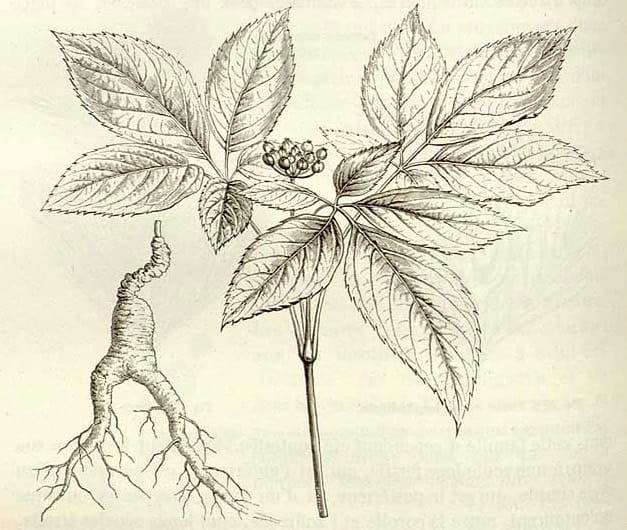 Panax ginseng (as Aralia ginseng)
Panax ginseng (as Aralia ginseng)Baillon, H.E., Histoire des plantes, vol. 7 (1877-1880)
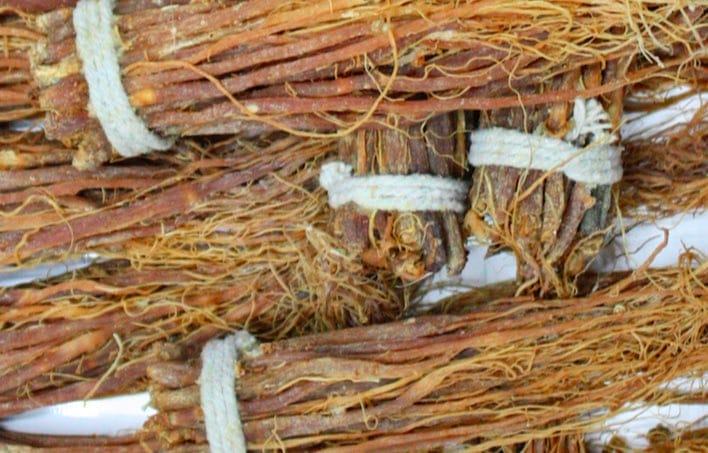
|
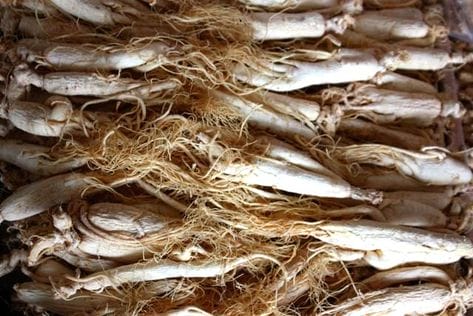
|
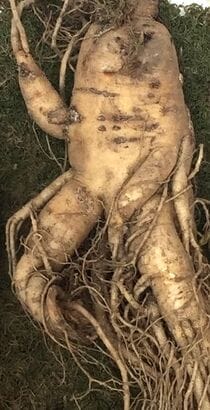
Ginseng often forms man-like roots, hence its name RenShen ‘Man root’. This is similar to the way Mandrake got its name in the West. This example is doing his best Elvis impersonation! (Adam, 2017) |
See also:
Ginseng from the General History of China
Observations on Ginseng
Botanical name:
Panax ginseng (syn. Aralia ginseng)
Panax quinquefolium is the closely related American Ginseng
Parts used:
Root
Note: 3 main types of Ginseng are used:
1. White Ginseng (Ren Shen, Bai Ren Shen), dried, unprepared; strengthens Qi and nourishes Yin.
2. Red or Korean Ginseng (Hong Shen), has been steamed with alcohol, is warmer and better to strengthen Yang and Qi, especially of the Kidneys.
3. American Ginseng (Xi Yang Shen); primarily a Yin tonic, it is weaker to strengthen Qi.
Temperature & Taste:
Warm, moist. Sweet, slightly Bitter
Classification:
N. Tonics
Uses:
1. Strongly Tonifies Qi:
-powerfully increases Qi of the Heart, Lungs, Spleen, and Kidneys in particular
-‘collapse of Qi’: fatigue, short of breath, cold limbs, sweating, very low pulse (ie. after blood loss, excess sweating or shock)
-can be used in a variety of chronic diseases and disorders associated with deficiency
-supportive tonic to increase and preserve health and promote longevity.
-Red Ginseng especially tonifies Kidney Qi and Yang
-‘consumptive and deficient diseases of all kinds in both men and women’. (Li Shi Zhen)
-‘antepartum and postpartum diseases.’ (Li Shi Zhen)
-‘Long-term taking of the drug maks the patient happy and able to enjoy a long life’. (Shen Nong Ben Cao)
2. Strengthens the Spleen and Stomach Qi:
-lethargy, poor appetite, abdominal distention, chronic diarrhea
-beneficial in recuperation and as support in old age.
-prolapses associated with Qi deficiency
3. Strengthens the Lung, Increases Qi:
-chronic cough, wheezing, shortness of Breath, labored Breathing
4. Benefits Heart Qi, Calms the Mind and Spirit:
-palpitation with anxiety, insomnia, forgetfulness, restlessness
-beneficial to support Brain function in the elderly
-‘strengthens the powers of Memory’. (Ming Yi Bie Lu)
–‘relieves restlessness and irritation’. (Li Xun)
5. Generates Fluid, Stops Thirst:
-‘Wasting and Thirsting disorder’; thirst with wasting as seen in Diabetes
-White Ginseng or American Ginseng are used for this purpose
-Heat Stroke
6. Clears Heat, Resists Poison:
-‘purges Fire from the Heart, Lung, Spleen and Stomach’ (Zhang Yuan Su)
–‘neutralizes the toxin in metal and stone drugs.’ (Da Ming)
Dose:
Powder: 500mg–2 grams;
Decoction: 3–9 grams (usually cooked separately in a double-boiler then added to other herbs once cooked)
Up to 30 grams is used in emergency situations such as Shock.
Preparation:
1. Red Ginseng (Hong Shen)
It is steamed with wine which turns it red and slightly translucent. This make it more warming to the Yang.
Correctives:
1. Oxymel (Unani)
2. Lettuce seed (Unani)
Substitutes:
1. Codonopsis Dang Shen is an accepted substitute in TCM. It is generally substituted except in cases of extreme Qi deficiency; dosage in generally increased 2–3 fold.
2. ‘It has similar functions to Licorice’ (Tao Hong Jing)
3. Glehnia Sha Shen (Zhang Jie Gu). Especially when there is Qi deficiency with Lung Heat.
4. Unani regards American Ginseng (Xi Yang Shen) as a substitute.
5. Date (Unani)
6. Withania is also used similarly, and is sometimes called ‘Indian Ginseng’. While it is not as strong to tonify the Qi, it has a broader scope of action, being used for various conditions including Weakness and Fatigue, Fertility, chronic Joint disease, Mental illness etc,
Main Combinations:
Taken with Cimicifuga Sheng Me to replenish Qi in the upper body
Taken with Poria Fu Ling to replenish Qi in the lower body and purge Fire from the Kidney
Taken with Astragalus Huang Qi and Licorice to purge Yin Fire and tonify Qi
Taken with Ginger to tonify Qi
Taken with Ophioglossum Mai Men Dong to restore the pulse
Deficiency in General:
1. Qi deficiency with Fatigue, poor appetite, pale face, weak pulse:
i. cook Ginseng with Mutton (or Lamb) (Ben Cao Shi Yi)
ii. Ginseng, Poria Fu Ling, Atractylodes Bai Zhu, Licorice (as in Si Jun Zi Tang)
2. Qi deficiency with Damp:
i. Ginseng, Atractylodes Bai Zhu, Poria Fu Ling, Citrus Chen Pi, Costus Mu Xiang
ii. Ginseng, Ginger, Poria Fu Ling, Pinellia Ban Xia
3. Marked Qi and Yang deficiency with sweating, ice-cold extremities, short of breath, very low pulse:
i. Ginseng with Cinnamon and Astragalus Huang Qi
ii. Ginseng with prepared Aconitum Fu Zi (as in Shen Fu Tang). This effect is both better and safer if Licorice and Ginger are added (this makes Si Ni Jia Ren Shen Tang)
4. Marked Qi and Blood deficiency:
i. Ginseng, Codonopisis Dang Shen, Dang Gui, Chinese Date (Da Zao), Lycium Gou Qi Zi (‘Goji’) made into a soup with Chicken.
ii. Ginseng, Dang Gui, Astragalus Huang Qi
5. Qi and Yin deficiency with sweating, shortness of Breath and a low pulse, Ginseng with Schisandra Wu Wei Zi and Ophiopogon Mai Men Dong (as in Sheng Mai San, ‘Generate the Pulse Powder’)
6. Yin deficient Heat, Hectic Fever, Cough:
i. Qi deficiency with Fire, Ginseng with Ophiopogon Mai Men Dong
ii. Ginseng with Paeonia Bai Shao, Dang Gui, Phellodendron Huang Bai, Anemarrhena Zhi Mu
iii. Ginseng with Turtle shell, Phellodendron Huang Bai
Spleen Deficiency:
7. Spleen Qi deficiency with fatigue, poor appetite, loose stool:
i. Ginseng with Atractylodes Bai Zhu, Poria Fu Ling and Licorice (as in Si Jun Zi Tang, ‘Four Gentlemen Decoction’)
ii. Ginseng, Astragalus Huang Qi, Poria Fu Ling, Chinese Red Date (Da Zao)
8. Marked Spleen Qi deficiency and sinking of the Yang Qi, including Prolapses, Ginseng with Astragalus Huang Qi, Dang Gui, Bupleurum Chai Hu (as in Bu Zhong Yi Qi Tang)
9. Spleen affected by ‘Ministerial Fire’: symptoms include fever, restlessness, wheezing, headache, thirst, fast pulse. Use Ginseng with Phellodendron Huang Bai (Li Dong Yuan)
Lung Tonic:
10. Lung tonic, Ginseng with Chinese Red Date (Da Zao), form pills. (Zao Shen Wan from Chinese Materia Medica, Stuauoft)
11. Asthma, Wheezing, shortness of Breath from Kidney and Lung deficiency:
i. Ginseng with Walnut and Licorice
ii. Ginseng with Walnut and Gecko Ge Jie.
iii. severe cases, Ginseng, Cordyceps
12. Chronic Cough from Lung weakness:
i. Ginseng with Coltsfoot flower (Kuan Dong Hua), Almond kernel and Licorice.
ii. Ginseng with Asparagus root (Tian Men Dong), Lillium Bai He,
Heart Deficiency:
13. Insomnia, palpitation, shortness of breath, poor appetite from Heart and Spleen deficiency,
i. Ginseng with Ganoderma Ling Zhi
ii. Ginseng with Polygala Yuan Zhi and Zizyphus semen Suan Zao Ren
ii. Ginseng with Dang Gui, Astragalus Huang Qi, Longan Long Yan Rou, Polygala Yuan Zhi (as in Gui Pi Tang)
14. Insomnia, palpitations, anxiety, irritability from Heart deficiency :
i. Ginseng, Salvia Dan Shen
ii. Ginseng with Rehmannia Sheng Di, Asparagus Tian Men Dong, Polygala Yuan Zhi, Zizyphus Suan Zao Ren (as in Tian Wan Bu Xin Wan)
15. Palpitations with spontaneous sweating:
i. Ginseng with Astragalus Huang Qi, Salvia Dan Shen
ii. Ginseng with Amber and Pearl
iii. decoct Ginseng, Dang Gui and Pork Kidney (Ben Cao Gang Mu)
Kidney deficiency:
16. Impotence from Kidney deficiency:
i. Ginseng with Cinnamon, Eucommia Du Zhong
ii. Ginseng with Velvet Deer Horn (Lu Rong)
iii. severe deficiency, Ginseng with Cordyceps
17. Exhaustion after sex:
i. decoct Ginseng with citrus Chen Pi. (Ben Cao Gang Mu)
ii. Ginseng, Deer Horn
iii. Ginseng, Shilajit
18. Kidney weakness from excess Sex:
i. Ginseng with Rehmannia Sheng Di, Poria Fu Ling and Honey (Ben Cao Gang Mu)
ii. Ginseng, Schisandra Wu Wei Zi, Dioscorea Shan Yao, Astragalus Huang Qi, Asparagus root Tian Men Dong
19. Nourish Kidney Essence and to anchor and astringe the Qi, Ginseng with Schisandra Wu Wei Zi. This increases Qi without generting Heat or Fire.
Major Formulas:
|
Ba Zhen Tang Bai Hu Jia Ren Shen Tang Ban Xie Xie Xin Tang Bao Yuan Tang Bu Fei Tang Bu Zhong Yi Qi Tang Chai Hu Gui Zhi Tang Chai Hu Jia Long Gu Mu Li Tang Dang Gui Nian Tong Tang Di Tan Tang Ding Zhi Wan Du Huo Ji Sheng Tang Fu Zi Li Zhong Wan Fu Zi Tang Gan Cao Xie Xin Tang Gan Jiang Huang Qin Huang Lian Ren Shen Tang Gui Pi Tang Gui Zhi Ren Shen Tang Gou Teng San Huang Lian Tang Huang Long Tang Jian Pi Wan Jiu Xian San Li Zhong Wan Liu Jun Zi Tang Mu Xiang Liu Qi Yin |
Ren Shen Bai Du San Ren Shen Bu Fei Tang Ren Shen Ge Jie San Ren Shen Hu Tao Tang Ren Shen Yang Rong Tang Sang Piao Xiao San Shen Fu Tang Shen Ling Bai Zhu San Shen Qi Si Wu Tang Sheng Mai San Shi Quan Da Bu Tang Si Jun Zi Tang Tai Shan Pan Shi San Tian Wan Bu Xian Dan Wen Jing Tang Wu Zhu Yu Tang Xiang Sha Liu Jun Zi Tang Xiao Chai Hu Tang Xuan Fu Dai Zhe Tang Yang Xin Tang Zai Zao San Zhen Ren Yang Zang Tang Zhen Zhu Mu Wan Zhi Gan Cao Tang Zhi Shi Xiao Pi Wan Zhu Ye Shi Gao Tang |
Cautions:
1. Not generally used in heat conditions (unless corrected in formula). Especially not used in Heat-type bleeding or external pathogenic heat.
2. Not used in rising Liver Yang.
Main Preparations used:
Red Ginseng (steamed with wine)
-
Extra Info
- History
The following excerpt is taken from A Complete History of Drugs (Pomet, London, 1748). It clearly demonstrates the link between ‘Vital Spirit’ of the West with ‘Qi’ in TCM:
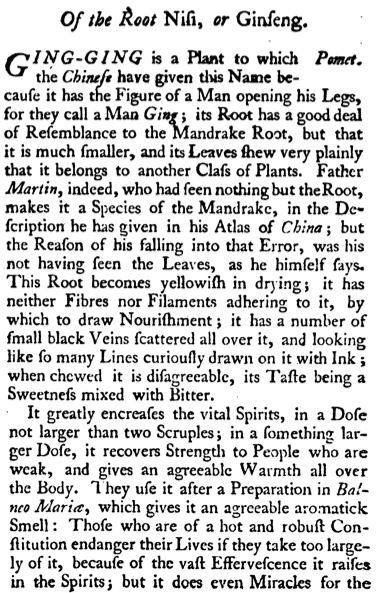
|
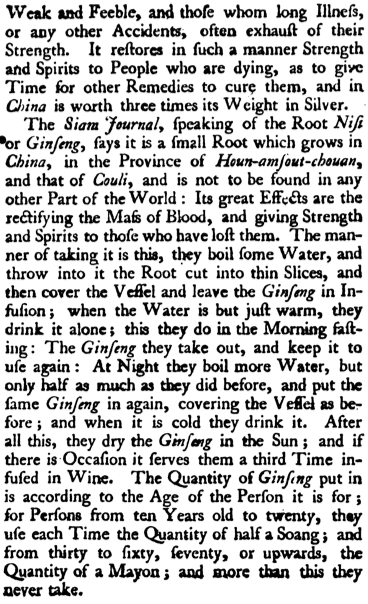
|
